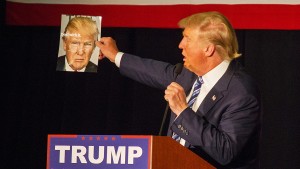The Stream - Saturday July 23, 2016
by Jonah Goldberg

CLEVELAND -- In normal times, the report this week that Donald Trump wanted John Kasich to be the real president would have made more of a splash.
According to Kasich aides, the Trump campaign desperately wanted the Ohio governor to be his running mate. Kasich, out of concern for his eternal soul or his political future, resisted the idea. But the Trump campaign pressed harder. At one point Donald Trump Jr. reached out with an amazing offer, according to the New York Times: How would Kasich like to be the most powerful vice president in American history? If elected, Trump would put Kasich in charge of two broad areas of policy making.
Now, if a normal person were asked to guess which two, he or she might venture, “Counterterrorism and health care,” or, “Defense and taxes.” But that’s thinking small. And Donald Trump doesn’t think small.
Donald Trump Jr. offered Kasich both foreign policy and domestic policy.
“What the h**l would Trump do?” the aide reportedly asked Trump the younger.
“He would make America great again,” Trump Jr. casually replied, according to a story in the Columbus Dispatch.
When I first read that, I couldn’t help but think of that scene in The Blues Brothers where Dan Aykroyd asks the manager of a honky-tonk what kind of music is played there. The manager replies, “Oh, we got both kinds. We got country and western.”
There’s no love lost between the Kasich and Trump camps, so it’s fair to be skeptical of the story. The only thing is, there are lots of rumors among Republican politicians and staffers that back it up. Trump’s not interested in policy. He’s fine with outsourcing it to congressional Republicans and to his Cabinet secretaries. Trump wants to do the fun stuff. He wants to give cool speeches and fly around in a better plane. He wants the respect that comes with being president. He doesn’t want to do the hard stuff.
For those willing to see, there’s been a lot of evidence of that all along. He’s said he won’t even start learning about policy until he’s elected. That Trump doesn’t know or care much about public policy is obvious to literally every human being who knows anything about public policy. One could fill books with examples of him talking about articles of the Constitution that don’t exist, events that never took place and proposals that make no sense.
According to a deeply reported account in GQ, Trump’s daily briefing packet amounts to a printout of a Google News search of articles mentioning “Donald J. Trump.”
This is also how he runs his business. He’s a marketer and branding maven. Other businessmen and subcontractors do the heavy lifting.
Woodrow Wilson was the first to see the president as a kind of monarchical cheerleader. He was the first commander in chief to insist that a president must impose a “vision” on the country; Wilson saw the job as that of a propagandist in chief.
Richard Neustadt, the titan of presidential studies, echoed this in his landmark book, Presidential Power. Because modern presidents are expected to do so much more than what their Constitutional powers can achieve, they must mold public opinion. “Presidential power,” Neustadt famously wrote, “is the power to persuade.”
It’s unlikely that Trump knows any of that, but that doesn’t mean he’s not onto something about the presidency. Barack Obama, after all, has spent much of his presidency trying to build a grass-roots movement to force change on Washington that he couldn’t achieve from the White House.
Many Republicans I’ve talked to find Trump’s willingness to outsource actual policy making to Mike Pence or Paul Ryan reassuring. And in a sense, it is.
But it overlooks a problem. Because there is so much power in a president’s words, a president’s words matter. Just this week, the GOP nominee suggested that he would not honor our commitments to NATO if Russia attacked our allies in the Baltics. Those words are dangerous from a nominee. They would be catastrophic from a president.
A president with a verbal hair trigger -- one who doesn’t know enough to know what not to say -- could ignite a financial crisis or a war.
If Trump could be trusted to simply play a ceremonial role, serving as a kind of corporate motivational speaker for the country, I might board the Trump train. But can anyone say with confidence that Trump has the discipline to do anything of the sort?
Jonah Goldberg is a fellow at the American Enterprise Institute and a senior editor of National Review. You can write to him by e-mail at goldbergcolumn@gmail.com, or via Twitter @JonahNRO.
(C) 2016 TRIBUNE CONTENT AGENCY, LLC
Read More Here
No comments:
Post a Comment